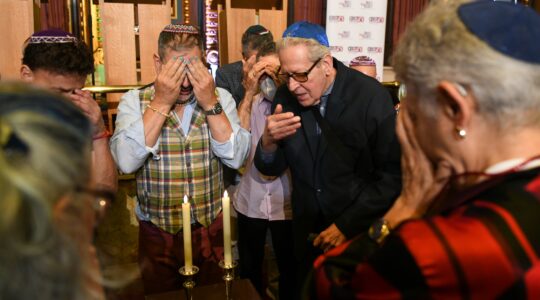I must admit, I am fairly addicted to technology and gadgets. I grew up loving video games (Pong and Atari 2600 started it all for me) and still have four different console systems at home. I tend to be an early adopter of new devices, and can seldom be found without my iPhone or iPad close by. Yet, even when I admit this to myself, there is still a little judgmental voice inside that believes that smart phones, tablets, computers and games disrupt society and distance us, especially in a Jewish context. Luckily, a number of recent experiences have proven that technology actually helps to connect us and to improve our Jewish lives.
The most personally rewarding application of technology lately has been my ability to stay in touch with my brother, Adam. Adam and his wife, Melissa, moved to Israel this year for his first year of rabbinical school at Hebrew Union College-Jewish Institute of Religion. As their year in Israel approached, I reflected a lot about how hard it was for me, 14 years ago, to move to Israel. Long-distance phone calls were so expensive, and snail mail lives up to its name. I had email, but most of my friends and family did not. Now, Adam and Melissa are able to share so much of their Israel experience with us all. Smart phones, social media and the ability to make video calls to each other helps the distance between us feel much shorter. We are able to “tour” their apartment. We can follow their adventures and trips via Facebook. We can read what they are reading on Twitter.
My thinking about this goes back a few years. About six years ago, my father was ill during the High Holy Days. My mother, who worked at the time as the cantor of our home synagogue, had to go in to sing and help lead these holiest of days. My sister flew home to Chicago to help out, and she was sad that my father was unable to attend worship. My father calls himself the “kveller feller,” and he just beams whenever my mother sings. Thanks to the proliferation of cell phones, my sister was able to attend services, dial my father, and allow him to feel like he was there, even from his hospital bed. I truly feel that this must have helped his healing during that difficult time.
Then, six months ago, I was officiating at an unveiling ceremony for a family at a local cemetery. One of the daughters of the deceased lives overseas, and, due to a health issue, she was unable to fly to the U.S. to attend the ritual. The family felt badly that she could not be there, and technology saved the day. Her sister proudly held up an iPad during the unveiling service so that her sister could feel as if she was fully participating. She got to hear all of the kind thoughts and memories shared during the event, and others had an opportunity to speak to her directly.
This past High Holy Days I was struck again by the ways in which technology can bring us together rather than distance us. A number of congregants were homebound due to illness or recovery from surgeries, and they expressed sorrow that they were unable to join the Temple B’nai Torah community for Rosh HaShanah and Yom Kippur. Though our congregation itself does not yet live-stream our services, I encouraged these folks to either find a congregation online which does stream their worship, or to turn to Shalom TV, which was live-streaming services from Central Synagogue in New York City. Most of them chose to watch the services from Central, and I overheard one saying to the other a week later, “Hey, even though I was at my house, and you were at yours, I was ‘at services’ with you!”
Just this weekend, an adult student of mine shared with me that she will be undergoing surgery over the next few weeks. She is concerned, as she is part of our current Adult B’nai Mitzvah class, and she treasures each week of learning with the class. One of her fellow students said, “Rabbi, can we Skype with her so she can be with us?” “Of course!” I answered. How wonderful to know that this student could both convalesce and attend class at the same time.
Hillel said, “Do not separate yourself from the community.” (Pirkei Avot 2:5) There are so many ways in which phones, tablets, and other forms of communication help us experience worship, attend lifecycle events, and stay in touch over large distances. I encourage you all to look at the ways in which your own use of computers and other devices enable you to enhance your own Jewish life, as an individual, as a family, and as a member of a world-wide community.
Rabbi Marci Bellows is a spiritual leader at Temple B’nai Torah community in Wantagh, Long Island. A native of Skokie, IL., she earned a B.A. in Psychology from Brandeis University and a Masters in Hebrew Literature in 2003 from Hebrew Union College-Jewish Institute of Religion. She was ordained in 2004.
The New York Jewish Week brings you the stories behind the headlines, keeping you connected to Jewish life in New York. Help sustain the reporting you trust by donating today.




